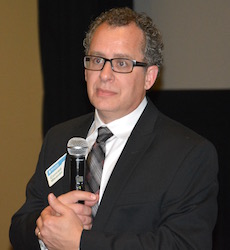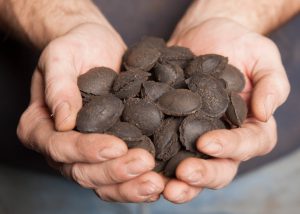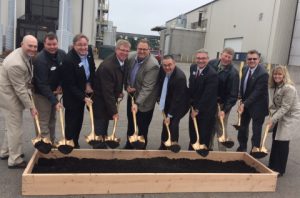As a hush came over the theater last night and the lights went down for the opening scene of the documentary Thirsty Land, the sound of rain pounding on the roof served as background noise. A bit ironic. Especially in light of meeting a community in California that has run out of water.
 Thirsty Land, directed and produced by Conrad Weaver, focuses on the multi-year drought facing California, Washington and other southwestern states. The documentary debuted as part of the Water for Food Global Conference taking place April 24-26 in Lincoln Nebraska at the Nebraska Innovation Campus.
Thirsty Land, directed and produced by Conrad Weaver, focuses on the multi-year drought facing California, Washington and other southwestern states. The documentary debuted as part of the Water for Food Global Conference taking place April 24-26 in Lincoln Nebraska at the Nebraska Innovation Campus.
Maybe the biggest impact the drought has had is not to consumers, but to hundreds of farmers in California who were given no water allocation for the 2015 growing season. This has led to hundreds of thousands of acres of fallow agricultural land, much of which used to produce much of America’s produce, fruits and nuts. Yes, consumers, no water = no food. No water = no life. For anyone.
Why must I make this obvious statement? Because as water shortages become more common, there has been a call for agriculture to reduce its use of water. Approximately 70 percent of all water used globally is for agriculture. Farmers are feeling the pressure of lack of water while trying to grow safe, healthy food and more of it. A resonating message in the film from the farmers is “Stop vilifying us. Stop vilifying agriculture. We need to work together to solve water problems, not play the blame game”.
A truer statement was not uttered. Farmers intrinsically understand the value of water and have been some of the first in the country to begin integrating water sustainability and conservation programs. Thirsty Land follows the journey of growers who share their stories of how water shortages have affected operations from dairy farmers to fruit producers to sheep producers. The film follows the farmers as they try to find solutions to get through the drier years; yet still produce enough food to keep the farm in operation all while putting conversation programs in place for future drier years.
 There are some very touching stories in the film – especially around the town in California with no water while the documentary was being filmed. Weaver said they did get access to water again earlier this year but it’s still spoty, at best. The cinematography is stunning in places and there is even a horrific beauty in the shots of deep cracked earth and the dying environment.
There are some very touching stories in the film – especially around the town in California with no water while the documentary was being filmed. Weaver said they did get access to water again earlier this year but it’s still spoty, at best. The cinematography is stunning in places and there is even a horrific beauty in the shots of deep cracked earth and the dying environment.
While the documentary is about the unbreakable connection of water and food, it is really a film not for the agriculture industry, says Weaver, but for consumers. Weaver stresses there is a need for consumers to better understand the dynamics of water and food and thus, become more supportive of water programs that put agriculture first.
Thirsty Land will be playing in cities across the country and on college campuses this fall. Please go see this film when it comes to your community or campus. If it is not scheduled, then consider hosting a screening. And consider donating funds to get this film in front of as many consumers across the country as possible.
To learn more about the film, the experiences of the filmmaker and why he feels Thirsty Land is so important, listen to my interview with Conrad Weaver here: Conrad Weaver, Thirsty Land Producer & Director












